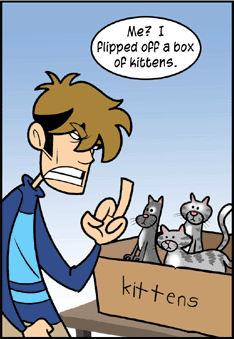Informed Wrongness
 In much of Fantasyland, Evil Overlords are apparently too busy brushing their Persian cats, cackling, and concocting Rube Goldberg-style traps for the hero to do anything...well, evil. This problem of having too little time for actual villany is also shared by the antagonists in many genres, most particularly by the enemies of cannon Mary Sues. This is the ideal breeding ground for Informed Wrongness, which rears its head whenever the author doesn't want to spend any time depicting actual bad deeds, think about the logistics of the Evil Empire, or risk having their main character be wrong during a debate.
In much of Fantasyland, Evil Overlords are apparently too busy brushing their Persian cats, cackling, and concocting Rube Goldberg-style traps for the hero to do anything...well, evil. This problem of having too little time for actual villany is also shared by the antagonists in many genres, most particularly by the enemies of cannon Mary Sues. This is the ideal breeding ground for Informed Wrongness, which rears its head whenever the author doesn't want to spend any time depicting actual bad deeds, think about the logistics of the Evil Empire, or risk having their main character be wrong during a debate.The most obvious example of this is the Evil Empire That Doesn't Do Anything, in which our heroes are part of a rag-tag rebellion against a vile, repressive government which...collects taxes and stuff. Unless we see that the government is being inexcusably awful, your protagonists tend to come off as Fantasyland domestic terrorists; at it's worst, the Evil Empire looks like it's taking a sensible approach.
Informed Wrongness also becomes a tool to shut down discussion, especially in cases where the protagonist might be wrong, the antagonist might have a point, or both.We're told that the antagonist is a Bad Person for no discernible reason, other than that they're clashing with the main character.
For the sake of audience sympathy, it's important to work out if the antagonist is evil-- in which case, we need to see some real villainy proportional with the protagonist's response-- or if they're just another angle on a complex situation, in which case, it's totally okay for them to have some reasonable points, as long as the protagonist has more, better points.
Published on April 09, 2013 02:07
No comments have been added yet.



